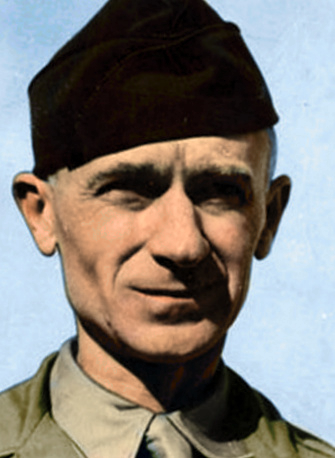The Pittsburgh Press (June 23, 1944)

Roving Reporter
By Ernie Pyle
On the Cherbourg Peninsula, France – (by wireless)
The day after troops of our 9th Division pushed through and cut off this peninsula, I went touring in a jeep over the country they had just taken.
This Norman country is truly lovely in many places. Here in the western part of the peninsula the ground becomes hilly and rolling. Everything is a vivid green, there are trees everywhere, and the view across the fields from a rise looks exactly like the rich, gentle land of Eastern Pennsylvania. It is too wonderfully beautiful to be the scene of war, and yet so were parts of Tunisia and Sicily and Italy. Someday I would like to cover a war in a country that is as ugly as war itself.
Our ride was a sort of spooky one. The American troops had started north and were driving on Cherbourg. This was possible because the Germans in that section were thoroughly disorganized, and by now capable of nothing more than trying to escape.
There was no traffic whatever on the roads. You could drive for miles without seeing a soul. We have been told that the country was still full of snipers, and we knew there were batches of Germans in the woods waiting to surrender. And yet we saw nothing. The beautiful, tree-bordered lanes were empty. Cattle grazed contentedly in the fields. It was as though life had taken a holiday and death was in hiding. It gave you the willies.
Finally, we came to a stone schoolhouse which was being used as a prisoner-of-war collection point, so we stopped for a look. Here groups of prisoners were constantly being brought in. And here individual American soldiers who had been cut off behind the lines for days came wearily to rest for a while in the courtyard before going on back to hunt up their outfits.
Most of the prisoners coming in at the time were from a captured German hospital. German doctors had set up shop in a shed adjoining the school and were treating their prisoners, who had slight wounds. At the moment I walked up, one soldier had his pants down and a doctor was probing for a fragment in his hip.
Two of three of the German officers spoke some English. They were in a very good humor. One of them, a doctor, said to me:
I’ve been in the army for four years and today is the best day I have spent in the army.
In this courtyard, I ran onto two boys who had just walked back after losing their jeep and being surrounded for hours that morning by Germans.
They were Pfc. Arthur MacDonald of Portsmouth, New Hampshire, and Pvt. T. C. McFarland of Southern Pines, North Carolina. They were forward observers for the 9th Division’s artillery.
They had bunked down the night before in a pasture. When they woke up, they could hear voices all around, and they weren’t American voices. They peeked out and saw a German at a latrine not 30 feet away.
So, they started crawling. They crawled for hours. Finally, they got out of the danger zone, and they started walking. They met a French farmer along the road, and took him in tow.
They said:
We sure captured that Frenchman. He was so scared he could hardly talk. We used high-school French and a dictionary and finally got it through his head that all we wanted was something to eat. So, he took us to this house. He fried eggs and pork and made coffee for us.
Our morale sure was low this morning, but that Frenchman we captured fixed it up.
The boys pulled out a couple of snapshots of the Frenchman, and they were so grateful that I imagine they will carry those pictures the rest of their lives.
At this time the French in that vicinity had been “liberated” less than 12 hours, and they could hardly encompass it in their minds. They were relieved, but they hardly knew what to do.
As we left the prison enclosure and got into our jeep, we noticed four or five French countrypeople – young farmers in their 20s, I would take them to be – leaning against a nearby house.
As we sat in the jeep getting our gear adjusted, one of the farmers walked toward us, rather hesitantly and timidly. But finally, he came up and smilingly handed me a rose.
I couldn’t go around carrying a rose in my hand all afternoon, so I threw it away around the next bend. But little things like that do sort of make you feel good about the human race.
